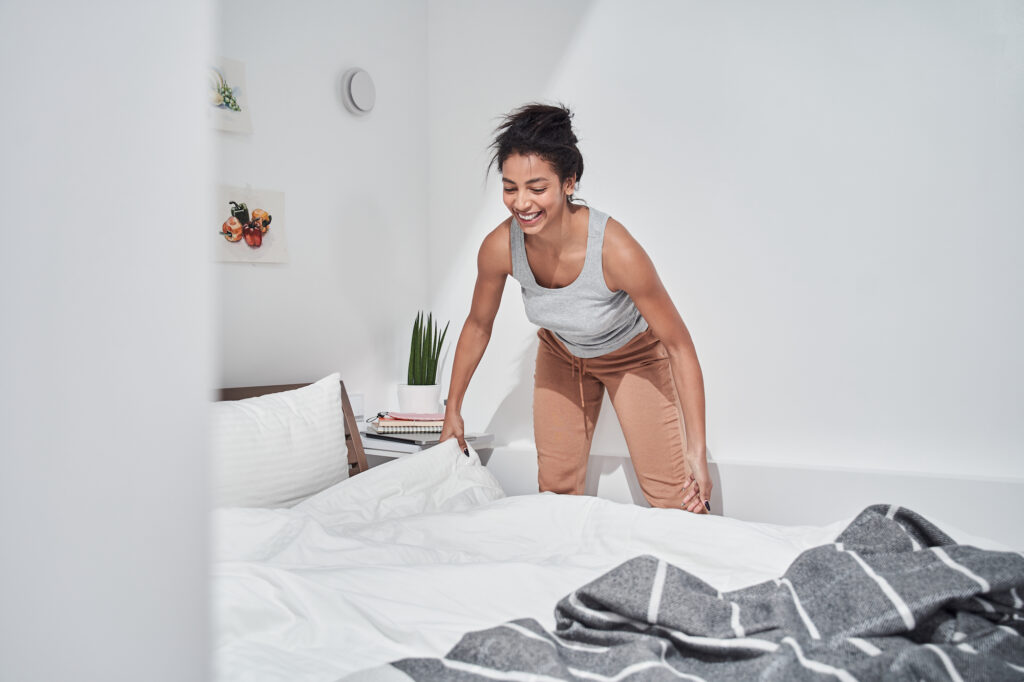How Bedroom Temperatures and Bedding Choices Impact Your Sleep

It’s a well-known fact that being too hot or too cold can affect your sleep, but experts have long struggled to agree on the best bedroom temperature. Now, new research suggests that not only does this vary from person to person, but it might be more complex than previously thought.
A recent study published in the journal Science of the Total Environment tracked bedroom temperatures for a group of 50 older adults. They found that participants tended to sleep worse when room temperatures dropped below 68 degrees Fahrenheit or rose above 77 degrees. People whose bedrooms reached 86 degrees experienced a 5% to 10% drop in sleep efficiency, meaning they spent more time awake in bed unsuccessfully trying to sleep.
Sleep experts typically recommend maintaining a bedroom temperature between 60 and 68 degrees Fahrenheit — significantly lower than the range found in the present study. Core body temperature naturally drops in preparation for sleep. But high room temperatures can hamper the body’s cooling and lead to poor sleep and shorter sleep time.

An important finding from the study was that the ideal room temperature appears to vary among sleepers. Lead author Amir Baniassadi, Ph.D., said, “ These results… [emphasize] the importance of personalized temperature adjustments based on individual needs and circumstances”. The ideal temperature range may also change across the lifespan, as older adults often have more trouble staying warm.
Another group of researchers sought alternative ways to optimize the sleep environment, particularly in colder climates. These researchers examined how well participants could tolerate a hot or cold bedroom depending on the warmth of their duvet.
The results, published in the Journal of Thermal Biology, revealed that when using a thinner duvet, the optimal bedroom temperature range was relatively small. People needed the room to be 62 to 72 degrees Fahrenheit to feel comfortable. With a heavier duvet, people slept comfortably in rooms that varied by as much as 18 degrees–as cold as 46 degrees or as warm as 64 degrees.
The bottom line? The participants had good sleep quality as long as they could maintain a temperature of 86 to 91 degrees in their bed. The authors noted that heavier duvets gave sleepers a wider range of comfortable bedroom temperatures.
Blankets create small climates in the sleep environment, allowing sleepers to regulate their temperature in bed by adjusting their blankets. This flexibility and the infinite choices in bedding types may explain why scientists get conflicting results when trying to establish a one-size-fits-all recommendation for bedroom temperatures.
So while a breathable mattress and lighter blanket may be helpful during summer months, a blanket and pajamas that are thicker, heavier, or made of insulating materials can help you stay warm this winter without blasting the heat.
Got a hot tip? Pitch us your story idea, share your expertise with SleepFoundation.org, or let us know about your sleep experiences right here.
References
7 Sources
-
Rifkin, D. I., Long, M. W., & Perry, M. J. (2018). Climate change and sleep: A systematic review of the literature and conceptual framework. Sleep medicine reviews, 42, 3–9.
https://pubmed.ncbi.nlm.nih.gov/30177247/ -
Janssen, H., Ford, K., Gascoyne, B., Hill, R., Roberts, M., Bellis, M. A., & Azam, S. (2023). Cold indoor temperatures and their association with health and well-being: A systematic literature review. Public health, 224, 185–194.
https://pubmed.ncbi.nlm.nih.gov/37820536/ -
Baniassadi, A., Manor, B., Yu, W., Travison, T., & Lipsitz, L. (2023). Nighttime ambient temperature and sleep in community-dwelling older adults. The Science of the total environment, 899, 165623.
https://pubmed.ncbi.nlm.nih.gov/37474050/ -
Seol, J., Kokudo, C., Park, I., Zhang, S., Yajima, K., Okura, T., & Tokuyama, K. (2023). Energy metabolism and thermoregulation during sleep in young and old females. Scientific reports, 13(1), 10416.
https://pubmed.ncbi.nlm.nih.gov/37369712/ -
Hebrew Senior Life (August 28, 2023) Optimal Sleep Temperature for Seniors Is Between 68 to 77 Degrees Fahrenheit, Study Reveals. Harvard School Affiliate Press Release., Accessed November 1, 2023.
https://www.hebrewseniorlife.org/news/optimal-sleep-temperature-seniors-between-68-77-degrees-fahrenheit-study-reveals -
Yan, F., Zheng, Q., & Ke, Y. (2023). Effect of quilt thermal resistance on bedding system and sleep thermal comfort. Journal of thermal biology, 117, 103713.
https://pubmed.ncbi.nlm.nih.gov/37748286/ -
Harding, E. C., Franks, N. P., & Wisden, W. (2019). The temperature dependence of sleep. Frontiers in Neuroscience, 13, 336.
https://pubmed.ncbi.nlm.nih.gov/31105512/












































































